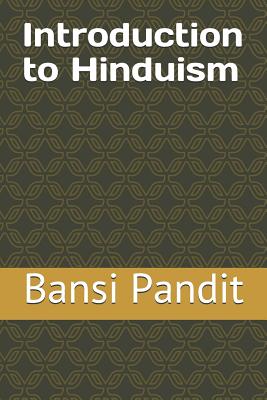Introduction to Hinduism

Introduction to Hinduism
Hindus have received their religion through revelation, the Veda, which is the sourcebook of Hindu tradition. Hindus maintain that the Veda is without beginning and without end. How can a book (or books) be without beginning or end? By the Veda, Hindus do not mean books. They mean the accumulated treasure of spiritual laws discovered by numerous sages and saints at different times in the course of the long history of Hindus and Hinduism in India. The Vedas teach that creation is without beginning or end and appears in eternal cycles of creation and dissolution. Hindus believe that the soul of man (Sanskrit: atman) is eternal and immortal, perfect and infinite, and death means only a change of center from one body to another. The present is determined by our past actions; and the future by the present. The whole purpose of Hindu religion is to become perfect, to become divine, to reach God, and see God. This reaching God, seeing God, and becoming perfect - even as the Father in heaven is perfect - constitutes the religion of the Hindus. On the surface, Hindu religion appears to be a religion of hopeless contradictions. On one hand, Hinduism teaches the highest spiritual philosophy of the Upanishads, complementary to the latest discoveries in science, and on the other hand, using the words of Swami Vivekananda, it includes 'the low ideas of idolatry with its multifarious mythology.' On one hand, it includes pure theistic theology, and on the other, it embraces the agnosticism of Buddhists - Buddha is an incarnation of God in Hinduism - and atheism of the Jains. Where then is, one may ask, the center of Hinduism to which all these divergent religious ideas finally converge? Or do they? This is a part of what this book shall attempt to explore. Hinduism has the world's largest literature of yoga, meditation, timeless tales (mythology), spirituality and mysticism. It includes the world's largest tradition of goddess worship and is the world's largest pluralistic tradition, which recognizes one Truth, but many paths to realize it. It emphasizes spiritual experience over religious theories and theologies, book, dogma or savior. Its religious insights are in harmony with modern principles of ecology and the New Age Movement. There is a significant agreement between Hindu spirituality and modern science on critical issues such as the age of the universe, its evolution in eternal cycles, and the process of creation and dissolution. Carl Sagan, a twentieth centur
PRP: 54.17 Lei
Acesta este Pretul Recomandat de Producator. Pretul de vanzare al produsului este afisat mai jos.
48.75Lei
48.75Lei
54.17 LeiIndisponibil
Descrierea produsului
Hindus have received their religion through revelation, the Veda, which is the sourcebook of Hindu tradition. Hindus maintain that the Veda is without beginning and without end. How can a book (or books) be without beginning or end? By the Veda, Hindus do not mean books. They mean the accumulated treasure of spiritual laws discovered by numerous sages and saints at different times in the course of the long history of Hindus and Hinduism in India. The Vedas teach that creation is without beginning or end and appears in eternal cycles of creation and dissolution. Hindus believe that the soul of man (Sanskrit: atman) is eternal and immortal, perfect and infinite, and death means only a change of center from one body to another. The present is determined by our past actions; and the future by the present. The whole purpose of Hindu religion is to become perfect, to become divine, to reach God, and see God. This reaching God, seeing God, and becoming perfect - even as the Father in heaven is perfect - constitutes the religion of the Hindus. On the surface, Hindu religion appears to be a religion of hopeless contradictions. On one hand, Hinduism teaches the highest spiritual philosophy of the Upanishads, complementary to the latest discoveries in science, and on the other hand, using the words of Swami Vivekananda, it includes 'the low ideas of idolatry with its multifarious mythology.' On one hand, it includes pure theistic theology, and on the other, it embraces the agnosticism of Buddhists - Buddha is an incarnation of God in Hinduism - and atheism of the Jains. Where then is, one may ask, the center of Hinduism to which all these divergent religious ideas finally converge? Or do they? This is a part of what this book shall attempt to explore. Hinduism has the world's largest literature of yoga, meditation, timeless tales (mythology), spirituality and mysticism. It includes the world's largest tradition of goddess worship and is the world's largest pluralistic tradition, which recognizes one Truth, but many paths to realize it. It emphasizes spiritual experience over religious theories and theologies, book, dogma or savior. Its religious insights are in harmony with modern principles of ecology and the New Age Movement. There is a significant agreement between Hindu spirituality and modern science on critical issues such as the age of the universe, its evolution in eternal cycles, and the process of creation and dissolution. Carl Sagan, a twentieth centur
Detaliile produsului








